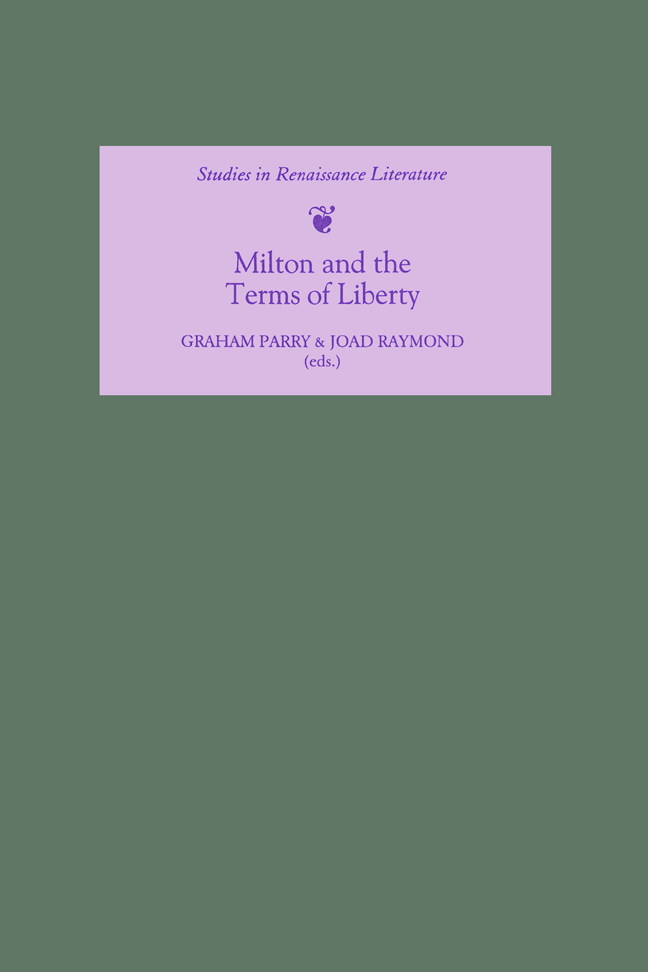Book contents
- Frontmatter
- Contents
- Contributors
- Acknowledgements
- Introduction
- 1 John Milton and the Politics of Slavery
- 2 Milton before ‘Lycidas'
- 3 Prosody and Liberty in Milton and Marvell
- 4 'In These Western Parts of the Empire': Milton and Roman Law
- 5 The King is a Thing
- 6 'in time of Warre … our Language is all corrupt with military Tearms': The Politics of Martial Metaphors in Post-regicide England
- 7 Alexander More Reads Milton: Self-representation and Anxiety in Milton's Defences
- 8 Stylometry and the Provenance of De doctrina christiana
- 9 The Figure and the Ground: Samson as a Hero of London Nonconformity, 1662-1667
- 10 The Publication of the King's Privacy: Paradise Regained and Of True Religion in Restoration England
- 11 'To try, and teach the erring Soul': Milton's Last Seven Years
- 12 Pandemonic Panoramas: Surveying Milton's ‘vain empires’ in the Long Eighteenth Century
- Index
- Studies in Renaissance Literature
4 - 'In These Western Parts of the Empire': Milton and Roman Law
Published online by Cambridge University Press: 15 February 2024
- Frontmatter
- Contents
- Contributors
- Acknowledgements
- Introduction
- 1 John Milton and the Politics of Slavery
- 2 Milton before ‘Lycidas'
- 3 Prosody and Liberty in Milton and Marvell
- 4 'In These Western Parts of the Empire': Milton and Roman Law
- 5 The King is a Thing
- 6 'in time of Warre … our Language is all corrupt with military Tearms': The Politics of Martial Metaphors in Post-regicide England
- 7 Alexander More Reads Milton: Self-representation and Anxiety in Milton's Defences
- 8 Stylometry and the Provenance of De doctrina christiana
- 9 The Figure and the Ground: Samson as a Hero of London Nonconformity, 1662-1667
- 10 The Publication of the King's Privacy: Paradise Regained and Of True Religion in Restoration England
- 11 'To try, and teach the erring Soul': Milton's Last Seven Years
- 12 Pandemonic Panoramas: Surveying Milton's ‘vain empires’ in the Long Eighteenth Century
- Index
- Studies in Renaissance Literature
Summary
MORE than forty years ago, concluding a survey of Milton's intellectual development, H. F. Fletcher voiced his regret that neither he nor anyone else had yet dealt adequately with the topic of Milton's ‘extraordinary knowledge of legal matters'. He for one was convinced that ‘there is no more fertile field of Miltonic studies remaining today than what can be found in the general topic of Milton's knowledge of law, whether or not we circumscribe it by the limiting word, English'. These were large and, if true, important claims. However, they have never been put to the test, with the result that we know very little more now than we did then about Milton's 'highly sentient knowledge of law’ or his ‘constant use of legal material'.
At first sight, of course, what Fletcher was saying appears to fly in the face of the evidence. Indeed, it would be far easier to construct the exactly opposing case and demonstrate from Milton's published writings, early and late, that his detestation of the law was such as seemingly to preclude any sustained or detailed engagement with it. Thus in the seventh Prolusion, for example, he derides the dialect of the lawyers which resembles ‘no human speech at all', and, in Elegy 1, the ‘barbarous jargon’ of the barrister. Much later, in The Tenure of Kings and Magistrates, he scorns those who hanker after ‘that old entanglement of Iniquity, thir gibrish Lawes, though the badge of thir ancient slavery'. Rejecting constitutionalism, he celebrates instead ‘great actions, above the form of Law or Custom’ (3: 193-4). And later still, in Samson Agonistes, the impasse reached when Samson argues the Chorus into accepting his view that ‘Our law forbids at their religious rites/ My presence', can only be resolved by his sudden antinomian impulse to ‘go along’ with the Philistine Officer to the temple of Dagon.
The manuscript sources – Milton's Commonplace Book and the marginalia – tell the same story, perhaps even more clearly. A sermon by Savanarola yielded the precept ‘that one should obey the spirit rather than the letter of the law'. An entry from John Stow prompted the wish that we could now be ‘rid … of this norman gibbrish'.
- Type
- Chapter
- Information
- Milton and the Terms of Liberty , pp. 57 - 68Publisher: Boydell & BrewerPrint publication year: 2002
- 1
- Cited by



